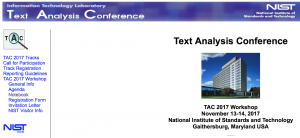MeaningCloud and LaBDA research group were present at the TAC 2017 conference held on November 13th – 14th at NIST headquarters in Washington. In the Text Analysis Conferences, research groups from all over the world were invited to develop software systems to tackle text analytics-related problems. This year, one task was devoted to the automatic identification of adverse drug reactions (ADRs) appearing in drug labels, including features defining the ADR, such as its severity or if it is characteristic of a drug class instead of just a given drug. There has been a specific subtask to link the identified ADRs with their corresponding MedDRA codes and lexical terms. More than 10 research teams have taken part in the project, all of them applying some kind of deep learning approach to the problem. Results show that it is possible to reach 8 5% accuracy when identifying ADRs.
5% accuracy when identifying ADRs.
We were delighted to present our text analytics-based system for ADRs identification on drug labels, which combines natural language processing and machine learning algorithms. The system has been built as a joint effort between MeaningCloud and LaBDA research group at the Universidad Carlos III de Madrid. Identifying ADRs is a basic task for pharmacovigilance, and that is the reason why the Federal Drug Administration (FDA) is involved in the funding and definition of the ADRs identification tasks in the framework of the Text Analysis Conferences. We have learned a lot these days (e.g., a BiLSTM deep neural network is the best choice for the purpose), and shared pleasant moments with our colleagues at Washington. We hope to be able to attend next year’s edition, which will focus on the extraction of drug-drug interactions (DDI), another interesting task aimed at detecting situations where the use of a combination of drugs may lead to an adverse effect.
We have now a dedicated business exclusively focused on the health and pharmaceutical sectors
Konplik.Health begins operations with the health-related assets from MeaningCloud, including its leading natural language processing, deep semantic analysis, AI platform, and adaptations specific to the life sciences.


